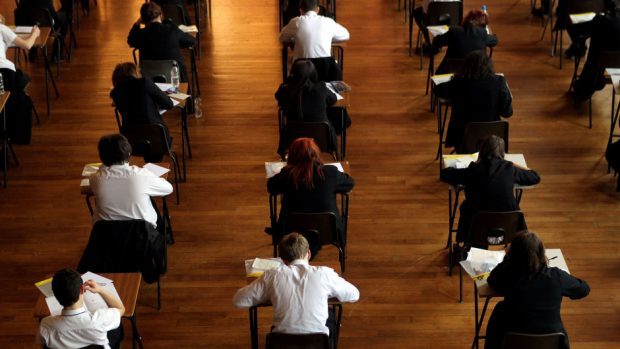Pupils across the north of Scotland were celebrating yesterday after an anxious wait for their results.
Exam pass rates significantly improved across the Highlands, islands and Moray – including many above national levels – despite an “unprecedented and challenging academic year”.
Due to exams being cancelled as a result of Covid-19, teachers had to rank candidates’ work during the year until lockdown and then the Scottish Qualification Authority (SQA) checked and validated that information.
Moderations to the results, up or down, were made by the SQA, if necessary, to ensure consistency across schools and colleges and consistency with results from previous years.
Highland, Shetland and the Western Isles recorded an increase in pass rates on last year, while Orkney reported exactly. Argyll and Bute had no specific figures but said the large majority had overcome the disruption and secured qualifications.
Meanwhile in Moray, chairwoman of the children and young people’s services committee Warren praised the “exceptional achievements” of pupils.
Schools in Moray noted an increase in passes at National 5 Maths by 5%; Higher English of 7% and Higher Maths of 2% which Mrs Warren said was a “perfect illustration” of the region’s focus on numeracy and literacy.
She added: “Across all our schools we have some exceptional achievements at all levels with more young people than ever before attaining seven grade as at National 5 level in S4 and also three and four grade As at Advanced Higher level in S6.”
In S4, there was an increase of Moray pupils achieving both one and five N5s as well as those passing six and seven national qualifications at this stage.
At Higher level for S5 learners, there was almost a 6% increase of those achieving at least one Higher and an improvement in people in both S5 and S6 attaining at least three Higher passes.
This year’s SQA results also handed the region their highest number yet of pupils achieving Advanced Higher passes in S6.
Attainment in Highland schools rose against all key indicators and improvement was around 2% above national levels of improvement.
Improvement in National 5 is 3.7% compared with national average improvement of 2.9%. Higher results showed a 6.2% improvement in comparison to national improvement of 4.1%.
There was also a a 7.5% improvement at Advanced Higher in comparison to a 5.4% improvement across Scotland.
Almost half (49%) of S4 students achieved five or more N5 awards (up from 46.2% in 2019), and 22.2% of S5 students achieved five or more Highers (up from 21.9% in 2019).
Education chairman John Finlayson said: “To show an improvement across the board and indeed, a higher level of improvement in Highland than across the national average, should be a cause for celebration across the council.
“These results are a credit to all our schools and young people and highlight a positive story in terms of education improvement all across Highland.
“We look forward to our schools returning next week so that our improvement journey in Highland schools can continue.”
In Shetland, education chairman George Smith said the results were a “testament” to pupils’ hard work and commitment.
Pass rates at N5 Grades A-C were 84% compared to 82% in 2019, including a higher percentage of pupils achieving an ‘A’ pass. The figure for Scotland is 81.1%.
Pass rates at Higher grades A-C were 82.5% compared to 81.9% in 2019 and is the highest rate since the new Higher was introduced in 2015. The figure for Scotland was 78.9%.
Pass rates at Advanced Higher grades A-C were 80.9% compared to 78.2% in 2019.
In the Western Isles, pass rates for those achieving A-C passes at N5 in S4 increased by 1.4% to 89.2%, representing a year-on-year increase in performance at this level.
A-C passes at Higher for S5 and S6 pupils increased significantly again this year by 2% to 80.6%.
After a small decrease in awards at Advanced Higher last year, a major increase of 13% was recorded this year, with A-C passes jumping to 92.9%.
Education chairman Angus McCormack said: “In what has been a most difficult year for pupils and school staff these results demonstrate just how much work has gone in to ensuring that our young people were not disadvantaged by having their education disrupted.”
In Orkney the overall pass rate remained strong at 83% – the same as last year.
Gwenda Shearer, the council’s education chairwoman said: “Never before have the exams been cancelled, so it has been a steep learning curve for all involved.
“But teachers and lecturers are best placed to have a strong understanding of how their learners have performed and, based on their experience and the evidence available, what a learner would be expected to achieve in each course.”
Early indications are that overall Argyll and Bute’s young people have overcome this disruption and secured qualifications that mean they move onto positive destinations.
Councillor Yvonne McNeilly, education policy lead in Argyll and Bute for the authority, said: “Sheer hard work, and partnership between our schools and their families have been key to ensuring that learning continues even in this unprecedented year.
“Our pupils had to deal with the pressures of leaving their familiar school routines and adjusting to new ways of learning.
“Our teachers worked tirelessly to deliver digital and home-learning options.”
